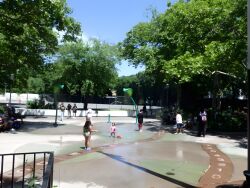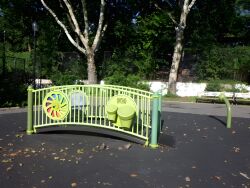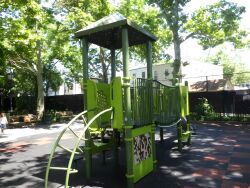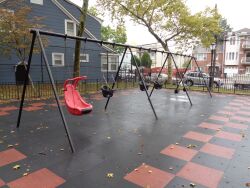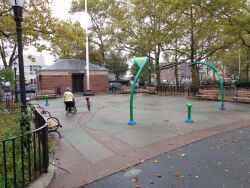Evergreen Park
Evergreen Park
This parkland draws its name from the nearby Cemetery of the Evergreens, which was founded in 1849. The Cemetery of the Evergreens, located along Bushwick Avenue on the Brooklyn-Queens border, is one of the many cemeteries that sprung up in Queens County in the 19th century.
After a decades-long struggle to eradicate yellow fever from Manhattan, city officials targeted filth and unsanitary burial conditions as the primary cause of disease epidemics. Burials were banned in southern Manhattan in 1830, and many cemeteries were built on Long Island, especially in what is now Queens. Developers believed that this area, with its beautiful rolling hills and woodlands, was more conducive to the peaceful seclusion they sought than the flat ground usually chosen for cemeteries. During the American Revolution these same hills served as the location for a beacon and lookout promontory.
In 1847, New York State had enacted the Rural Cemetery Act, and the Cemetery of the Evergreens was one of the first properties to be incorporated under the law as a non-sectarian, quasi-public institution. Some of the top architects, horticulturists, and engineers of the day designed the cemetery with both function and beauty in mind. Among the designing engineers were Major John Y. Culyer (1839-1924), who was chief engineer for Prospect Park in Brooklyn, and Calvert Vaux (1824-1895), who co-designed Central and Prospect Parks, and whose other design accomplishments include the Metropolitan Museum of Art.
Like the adjoining Highland Park, the Cemetery of the Evergreens is an arboretum and bird sanctuary. There are several monuments in the cemetery, including the Seaman’s Monument and the Actor’s Fund Memorial and Plot. The cemetery is the resting place for many New York celebrities, including dancer Bill “Bojangles” Robinson (1878-1949). Also buried in the Cemetery of the Evergreens are many of the victims of the 1911 Triangle Shirtwaist Factory fire.
The City of New York acquired the property for this park in January 1941. At that time, the park was divided by 60th Street, which cut through the property. The City then assigned Evergreen Park to the Board of Education and Parks in the spring of 1942. In order to expand the parkland and unify the two sections, the City closed 60th Street and gave the area to Parks. Part of the park is jointly operated with the adjacent P.S. 68. The playground opened officially on January 11, 1943.
Evergreen Park is located in the Queens neighborhood of Ridgewood, bounded by Metropolitan Avenue and Evergreen Cemetery. It is the Queens extension of the Brooklyn neighborhood of the same name. The town was originally inhabited by the Mespachtes Indians, and was then settled by Dutch farmers. In the early 18th century, the English settled in Ridgewood and named it after the prominent topographical feature. Ridgewood grew in the late 19th century when mass transit to the area was greatly expanded, and for some time was heavily populated with German-Americans.
From the end of the 19th century to close of World War I, the neighborhood was often known as “Evergreen,” after the Cemetery of the Evergreens. The town opted for this name because a Long Island community had already claimed the name Ridgewood for its own, and residents wanted to avoid confusion about their neighborhood. Ridgewood has remained primarily working class, and has recently attracted large numbers of Asian and Latin American immigrants.
Between 1999 and 2000, Mayor Giuliani contributed nearly $212,000 for renovations of Evergreen Park. Improvements included reconstructing the park’s sidewalks, paving, and play equipment. In addition to general site renovations, safety surfacing was installed under the two colorful jungle gyms. The park contains two fenced-in swing sets, one for tots and one for older children. There is a large fenced area, paved with asphalt, for jump-rope, hopscotch, and other games. In one corner, the fence is extended up to keep flyballs in the field, and there is concrete seating area along the side. The park is full of benches and picnic tables, as well as a number of different trees, including London planetrees (Platanus acerifolia). For the convenience of all the park’s visitors, there are several drinking fountains and a public restroom.
Check out your park's Vital Signs
Clean & Safe
Green & Resilient
Empowered & Engaged Users
Share your feedback or learn more about how this park is part of a
Vital Park System

